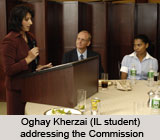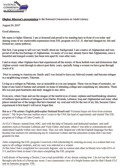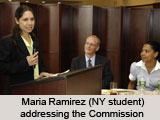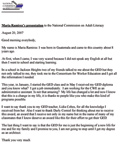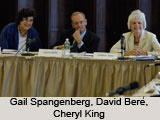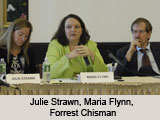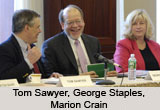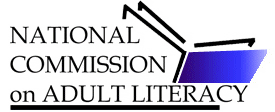 |
Making
Adult Education Work for Individuals and America |

PUBLICATIONS
and OTHER RESOURCES
The following publications were prepared for the Council for Advancement of Adult Literacy, the Commission's agent, as part of CAAL's program to help implement the Commission's report, Reach Higher, America, and its recommendations:
NC-CAAL11. THE POWER OF TECHNOLOGY TO TRANSFORM ADULT LEARNING: Expanding Access to Adult Education and Workforce Skills Through Distance Learning. This 65-page report is based on a 9-month project directed by Dr. Mary L. McCain of TechVision 21 in Washington, D.C. The report fleshes out the general technology recommendations made in Reach Higher, America, the final report of the National Commission on Adult Literacy. Federal and state government is the primary audience but CAAL also aims to inform private sector engagement and program and curriculum development activities. The centerpiece recommendation among several given is for establishment of a national web portal for adult learners and professional use. [October 21, 2009]
NC-CAAL10. REBUILDING NIFL TO MEET FUTURE NEEDS: A New and Innovative Agency with a Broader Mission, by Forrest P. Chisman and Gail Spangenberg. This 28-page discussion paper proposes substantial revamping of the National Institute for Literacy into a new independent National Institute for Adult Learning, with broad responsibilities for adult education and workforce skills development, including leadership in technology, stronger governance, and more adequate funding. [October 8, 2009]
NC-CAAL9. EXPANDING HORIZONS: Pacesetters in Adult Education for Work, by Forrest P. Chisman, is a report from the "Adult Readiness Roundtable" Project of CAAL carried out jointly with the National Center on Education and the Economy in April 2009. The 27-page report is designed primarily to help inform and stimulate thinking and action at the state and local levels. [June 26, 2009]
NC-CAAL8. 51008 SIDE-BY-SIDE OF WIA TITLES I AND II AND RELATED – prepared by CAAL to help advance the recommendations of the National Commission on Adult Literacy, for the Adult Education and Economic Growth Act under development by Congressmen Patrick Kennedy and Reuben Hinojosa.
NC-CAAL7. 50509 TESTIMONY– testimony by Commissioner David Bere to the Subcommittee on Higher Education, Lifelong Learning, and Competitiveness on May 5, 2009. David Bere is the President of the Dollar General Corporation (the principal funder of the work of the National Commission on Adult Literacy). His testimony, which references the Commission's work, focuses on Dollar General's long-standing experience with adult literacy as a funder and employer.
NC-CAAL6. 22409 SUPPLEMENTAL TESTIMONY – written testimony submitted on February 24, 2009 to Rep. Ruben Hinojosa and the Subcommittee on Higher Education, Lifelong Learning, and Competitiveness, in response to a request from Rep. George Miller. The question posed is: How can the Workforce Investment Act partners work with the Community Colleges near them to use the newly designated economic recovery package funding for training programs? (Also see NC-CAAL 4 and NC-CAAL 5.)
NC-CAAL5. 21609 SUPPLEMENTAL TESTIMONY – Supplemental testimony submitted by CAAL for House Subcommittee on Higher Education, Lifelong Learning, and Competitiveness (see NC-CAAL 4) in response to issues and concerns raised by a panel of testifiers at the February 12, 2009 Hearing.
NC-CAAL4. 21209 CONGRESSIONAL TESTIMONY – Written testimony for the Hearing of the House Subcommittee on Higher Education, Lifelong Learning, and Competitiveness (of the House Education and Labor Committee), February 12, 2009, chairman Congressman Ruben Hinojosa. Commissioner Morton Bahr testified on behalf of the Commission.
NC-CAAL3. CLMS BRIEF 3: ADJUSTING FOR INFLATION – prepared for CAAL by Northeastern University's Center for Labor Market Studies. This short document calculates the effect of inflation on the $20 billion in public expenditures called for by the Commission (in 2008 dollars) by the year 2020. [December 2008, 4 pp.]
NC-CAAL2. CLMS BRIEF 2: ESTIMATE OF SUI REVENUE, STATE BY STATE – prepared for CAAL by the Center for Labor Market Studies at Northeastern University to help develop the Commission's recommendation for a national trust fund for ABE and workforce skills development. The paper estimates the annual amounts of unemployment insurance tax collections for individual states for financing adult basic education/job training programs for U.S. workers under alternative wage base/state supplemental unemployment insurance tax rates. [November 2008, 15 pp.]
NC-CAAL1. CLMS BRIEF 1: ESTIMATE OF REVENUES FOR ABE FROM SUI TAX SURCHARGE – prepared for CAAL by the Center for Labor Market Studies at Northeastern University to help develop the Commission's recommendation for a national trust fund for ABE and workforce skills development. The paper estimates the annual levels of unemployment tax collections for financing adult basic education/job training programs for U.S. workers under alternative wage base/supplemental unemployment insurance tax rates. [October 2008, 6 pp.]
The following materials were prepared for the National Commission on Adult Literacy. Most may be reproduced and quoted with attribution. Here, they are in the form of downloadable PDF files (click each title below) and optimized for printing. Except where noted, bound full-color versions may be purchased directly from the Council for Advancement of Adult Literacy ($25 plus postage, contact [email protected] for ordering instructions.) Note that some of these documents are large and more accessible via high-speed connection.
11.
THE FISCAL CONSEQUENCES OF ADULT EDUCATIONAL ATTAINMENT (66 pages)
was prepared for the Commission’s fourth meeting on December 4th
by a team of researchers from the Center for Labor Market Studies of Northeastern
University, under the leadership of Commissioner Andrew Sum, who directs
the Center. The report studies the earnings of adults according to their
level of education achievement in terms of the impact those earnings have
on the fiscal affairs of the states and the lives of individuals. Appendix
E of the report gives estimates of annual net fiscal contributions of
adults by education attainment level for the 13 largest states. The report
findings have major implications for the purposes and conduct of the nation’s
adult education and literacy enterprise at all levels of service. The
report should also be of high interest to state and federal polilcymakers
and planners, as well as the business community.
10. CHALLENGES IN ASSESSING FOR
POSTSECONDARY READINESS (26 pages) was prepared for the fourth meeting
of the Commission on December 4, 2007. This Policy Brief was written by
Daryl F. Mellard and Gretchen Anderson of the Division of Adult Studies,
Center for Research on Learning, University of Kansas. It examines the
major assessments in use today to measure adult learning gains and determine
student placements – e.g., BEST, CASAS, TABE, COMPASS, ASSET, and
ACCUPLACER – in terms of their uses and how they well they align with postsecondary
education entry requirements. Special attention is given to the GED. The
authors identify several problems and challenges as well as recommendations
to resolve them.
9. POLICIES TO PROMOTE ADULT EDUCATION AND POSTSECONDARY ALIGNMENT (28 pages) was prepared for the 3rd meeting of the National Commission on Adult Literacy on August 20, 2007. As introduced by its author, senior policy analyst Julie Strawn of the Center for Law and Social Policy, the publication focuses on "helping adults with lower skills and/or limited English proficiency earn postsecondary credentials that open doors to family-supporting jobs." It examines obstacles to moving toward this goal -- with major attention to lack of alignment between federal and state adult education efforts, job training services, and postsecondary education policies. It also draws attention to the financial, personal, and family challenges that prevent adults from seeking and completing programs. Numerous policy and action recommendations are given for Commission consideration.
8. FAMILY LITERACY IN ADULT EDUCATION: The Federal and State Support Role was prepared for the August 20 meeting of the National Commission by Tony Peyton of the National Center for Family Literacy. This brief special perspectives paper (15 pp.) contains an Executive Summary and four major sections: (1) Making the Case: Why Provide Family Literacy Services; (2) Federal Support for Family Literacy; (3) Examples of State Family Literacy Initiatives; and (4) Issues & Recommendations. Among the five recommendations made by the author is that serious national and state attention should be given to the collection of comparable data about family literacy services, program types, funding, legislative provisions, and enrollments across the states, as well as research to fully demonstrate program outcomes.
7. WORKPLACE EDUCATION: TWENTY STATE PERSPECTIVES was prepared for the Commission's third meeting on August 20, 2007. This Policy Brief by education consultant James Parker (formerly of the U.S. Department of Education) describes various aspects of current workplace education programs in 20 states: AR, CA, CT, FL, GA, IN, KY, LA, MA, MN, MS, NY, NC, OH, PA, SC, TX, VA, WV, and WI. It examines how the programs are funded; the level of effort in each case for the past two years; connections, partnerships, and/or strategic plans implemented by workplace education programs; how states measure outcomes or determine success; the nature of workplace education outcomes achieved; challenges or barriers faced by the states; what the states consider to be the key elements of success in their workplace education efforts, and what future policy options the states would like to consider. One section of the paper presents seven policy options from the author's perspective. In an appendix to the study, state profiles are given for the 20 states examined. [September 4, 2007, 22 pages]
6. ADULT EDUCATION AND POSTSECONDARY SUCCESS was presented at the Commission's third meeting on August 20, 2007. This Policy Brief was prepared by researcher Stephen Reder of Portland State University and the National Center for the Study of Adult Learning and Literacy. It examines GED holders in comparison to their counterparts who have received a high school diploma as well as those with no high school credential. The comparisons are made in terms of long-term postsecondary education outcomes. The author makes numerous recommendations for expanding and restructuring the adult education system, with the goal of college readiness and success in mind. [September 4, 2007 (rev. 10-8-07), 29 pp.]
5. TOUGH CHOICES OR TOUGH TIMES – A DVD talk to the Commission by Marc S. Tucker, President of the National Center for Education and the Economy. This talk summarizes highlights of the report of the New Commission on Skills of the American Workforce, for which Dr. Tucker was the Study Director. It calls for dramatic, even controversial changes in the structure and conduct of America’s K-12 and education system. The DVD is viewable only online with QuickTime and Flash on both MAC or PC platforms with high-speed connections. [July 2007, 17 minutes] Click here for Flash viewing. Click here for QuickTime viewing. For smooth audio, please await the full download before playing.
4.
FORCES CHANGING OUR NATION'S FUTURE was
presented at the
Commission’s second meeting on April 17, 2007. This document is
by labor economist Andrew Sum of Northeastern University, a member of
the Commission. Dr. Sum is Professor and Director, Center for Labor Market
Studies at Northeastern. The resource is based on research findings from
The Perfect Storm (Educational Testing Service, March 2007) –
which Dr. Sum co-authored along with Irwin Kirsch and other ETS researchers.
It also draws on a number of other studies. The publication includes an
Author's Introduction and Executive Summary and 30 graphs and tables.
It examines the comparative performance of U.S. adults and youth on international
literacy assessments, the importance of literacy and numeracy proficiencies
for labor market success, and the projected outlook for literacy proficiencies
of U.S. adults. [June 18, 2007, 44 pages.]
3. DARE TO DREAM: A Collection of Papers from a Resource Group of 102 Education and Literacy Professionals was presented at the Commission's April 17th meeting in New York City. The papers in this collection were developed in response to questions posed in several thematic areas. They reflect the ideas, insights, cautions, and recommendations of a group of 102 education and literacy leaders, all indicated by name and affiliation. The broad challenge was to "think outside the box,” to imagine systemic changes that would be required to expand adult education and literacy service beyond the 3 million or so presently reached by publicly-funded programs to many times that number. [May 24, 2007]
2. MOUNTING PRESSURES FACING THE U.S. WORKFORCE AND THE INCREASING NEED FOR ADULT EDUCATION AND LITERACY was presented at the Commission's April 17th meeting. It was prepared by Dennis Jones (President) and Patrick Kelly (Senior Associate & Director, National Information Center), National Center for Higher Education Management Systems (NCHEMS). This 67-page document consists primarily of 50 color graphs reflecting current data from OECD, the U.S. Census Bureau, the U.S. Bureau of Labor Statistics, the National Center for Education Statistics, the U.S. Bureau of Justice, the U.S. Department of Education, GED Testing Service, and NCHEMS. The data set includes information on international comparisons, demographic trends within the U.S., U.S. education achievement levels with particular attention to groups of low achievement, and other variables that NCHEMS believes calls for a dramatically expanded and more effective adult education and literacy enterprise in America. A short introduction and executive summary indicates the authors' main conclusions. [May 21, 2007]
1. Four Lay-of-the-Land Papers on The Federal Role in Adult Literacy was presented at the Commission's first meeting in Nashville, TN, on November 14, 2006. The papers were prepared by Lennox McLendon (Adult Education and Literacy Legislation and Its Effects on the Field), Garrett Murphy (Adult Education & Literacy in the United States: Need for Services, What the Current Delivery System Looks Like, and Federal Role in Adult Literacy), and James Parker (Introduction to the Main Strands of Federal Adult Literacy Programming). [December 18, 2006]
